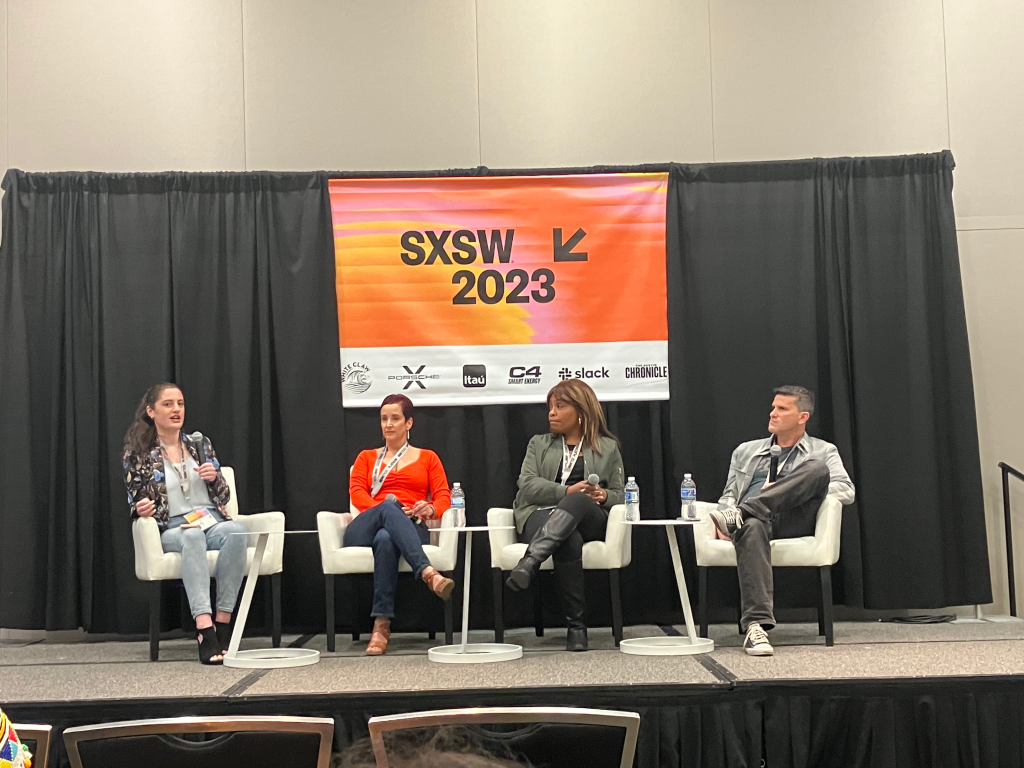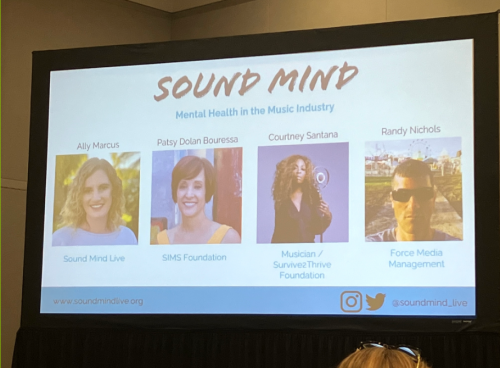By Stefny
Host of “The Emo Diaries”
On Wednesday, March 15, I attended a panel at SXSW titled “Mental Health in the Music Industry.” Mental health has been and continues to be an important topic for me, so I always attend these talks to see what the current situation is like and how we are looking to improve in the future.
This panel was moderated by Ally Marcus of Sound Mind Live, a “non-profit organization that focuses on building a community and open dialogue around mental health through music.” Panelists included Patsy Dolan Bouressa from Austin’s own SIMS Foundation, Courtney Santana from Survive2Thrive Foundation (and board member of SIMS), and Randy Nichols of Force Media Management (who has managed pretty much every band I’ve ever played on my show).

According to Patsy, the biggest trend they see at SIMS is the trifecta of depression, anxiety, and trauma from not only artists but any position in the music industry as well as their family members. Although from Randy’s perspective, he still sees mental health as quite stigmatized and doesn’t see many people talking about it, although his client Aaron Gillespie (drummer from Underoath) does a lot of press speaking about his own experiences.
“The best thing they can do is share their story. A lot of artists have said in the last few years they’re cancelling tours due to mental health but it’s really ticket sales. We need to be real and not use mental health as an excuse for a business problem. People have started to laugh at another mental health cancellation. You’re minimalising the importance of mental health.”
Randy Nichols
For her part, Patsy wanted to make sure that we know that, unlike most music-centric mental health services, SIMS is not just for musicians, although they do offer services such as band counseling, which is equitable to marriage counseling. Bands can attend these sessions before they go on tour to make sure everyone is on the same page and put to rest any concerns. SIMS also provides services to anyone in the music industry as well as their family members. They recognize that the music industry takes a toll not only on the people in it, but their loved ones also.
Courtney’s organization Survive2Thrive provides resources to victims of domestic violence and abuse, something she, unfortunately, understands all too well. About 20 years ago, she said, she and her two children found themselves at a shelter for domestic violence survivors after leaving an abusive relationship. While there, she used music as an outlet, writing almost 200 songs. “Music is one of the cures for trauma for me,” she said.
Music can be both the cause of and cure to your hardships and turmoil.
On the topic of insurance, something which can be hard to come by as a working musician, Patsy said there’s no parity. “There are whole levels of mental health care that aren’t even covered. There are safety nets across the nation for those who are un- or under-insured.” She cited Austin’s HAAM as a great resource for local musicians, as well as MusiCares and Backline as national resources, although SIMS has plans to expand nationally in the future.
“It’s really important if you’re getting the wrong help to find orgs like this to get the right help,” said Randy. It’s imperative that you find an organization that understands your struggles. In the same way you might want to find a therapist who understands complex issues such as LGBTQ+ struggles or being a POC, you want to search for a therapist who understands the ins and outs of the music industry.
As for touring, they all condone surrounding yourself with the best possible people. Women, POC, and LGBTQ+ individuals may face greater problems on the road. Randy said that “sometimes being a middle-aged white male, that experience doesn’t even compute” and so some people may need to be educated. He also reiterates the importance of bringing reliable and trustworthy people on the road, even if they’re not the best at their job. “Take the tour manager who’s 5% less good at their core job but is going to keep everyone in the right mindset.”
Finally, Randy made (what I believe to be) a great point about how to approach social media, a source of stress for many people, musicians or otherwise. “I like to look at social media like listening to the radio. Nobody worries about what’s happening on the radio when they aren’t listening.”
For more information and to hear a recording of the panel, please visit https://schedule.sxsw.com/2023/events/PP123259.
This post was first published on https://officialstefny.com/
